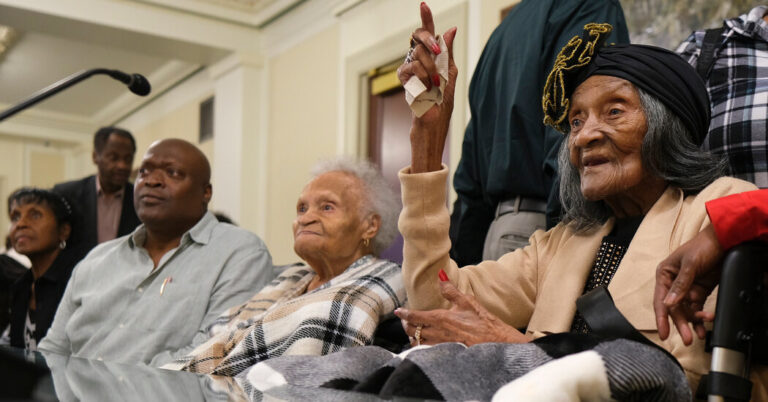The historic quest for justice by the last two centenarian survivors of the Tulsa Race Massacre likely ended Wednesday when the Oklahoma Supreme Court upheld a lower court’s dismissal of their lawsuit seeking compensation.
The ruling likely represents the final legal check for Recy Benningfield Rundle, 109, and Viola Ford Fletcher, 110, who were children at the time and who, after years of remaining silent, have begun to speak publicly, including in testimony before a congressional committee, about the details of one of the worst racially-charged crimes in American history.
Fletcher and Rundle argued that the destruction of Tulsa’s Greenwood neighborhood, then known as Black Wall Street, and the massacre of up to 300 African-Americans by a white mob was an ongoing nuisance that continues to cast a shadow over the neighborhood more than a century later.
The ruling puts an end to a lawsuit filed by Randle and Fletcher in 2020. Last year, another survivor of the massacre, Fletcher’s brother, Hughes Van Ellis, died at age 102. The plaintiffs filed their lawsuit under state, not federal, law and therefore cannot appeal to the U.S. Supreme Court.
Oklahoma judges ruled that while the plaintiffs’ complaints were valid, including the economic and social impacts of the massacre, they “did not fall within the scope of the state’s public nuisance law.”
“The continuing devastation allegedly caused within the Greenwood community by the massacre suggests intergenerational and societal inequities that can only be resolved by policymakers, not the courts,” the ruling states.
Damario Solomon Simmons, the lead attorney for the massacre victims, said what happened in the spring of 1921 was essentially “state-sponsored atrocity” and that closing the case without a trial would be a blow to the concept of racial justice. The lawyers plan to petition the court to reconsider the decision. They are also calling on the U.S. Department of Justice to open an investigation into the massacre.
“Oklahoma courts have once again failed the victims. We believe the verdict and reasoning are wrong,” he said.
Solomon Simmons said Randle and Fletcher were deeply disappointed with the verdict and hoped their defence team would continue to fight: “They are literally living in hope that justice will be achieved.”
Tulsa city officials said in a statement they are working on an economic development plan and “remain committed to working with residents and providing resources to support the North Tulsa and Greenwood communities.”
In the early 20th century, Greenwood was a town of cultural and economic success. On May 31, 1921, a white mob gathered outside the Tulsa courthouse where a young black man was being held for allegedly assaulting a young white woman.
White officers appointed to the city attacked the neighborhood from the ground and the air. Within two days, Greenwood was gone. Thirty-five city blocks were reduced to ashes, 300 residents were killed, and thousands were left homeless. The attack wiped out generations of wealth built during a time of intense racial discrimination.
No individual or group was ever held accountable, survivors were never compensated for their losses, and the events were forgotten. It took decades for the genocide to be spoken about publicly. Yvonne Koger, one of the nine justices on the Oklahoma Supreme Court, noted in a previous hearing that she did not learn about the massacre in high school.
The lawsuit, filed under Oklahoma’s public nuisance law, argues that the effects of the massacre continue to be deeply felt today. Solomon-Simmons said the city’s ongoing racial disparities, economic inequality and trauma for survivors and their descendants are evidence of the massacre’s long-lasting effects.
State and local officials say the massacre was horrific but that they should not be held responsible for what happened over two days in 1921.
The lawsuit, a rare attempt to hold the government responsible for the massacre, names as defendants the Tulsa County sheriff, county commissioners and the Oklahoma Military Department, which oversees the Oklahoma Army and Air National Guard.
District Judge Caroline Wall, who had ruled in May 2022 that the suit could move forward, dismissed it on procedural grounds in July 2023. Lawyers for the city argued that “mere connection to a historic event does not give an individual an unlimited right to seek compensation from any project that is in any way connected to that historic event.”
The following month, the Oklahoma Supreme Court agreed to hear an appeal of the lower court’s dismissal. On April 2, Solomon Simmons appeared before the nine-judge panel to ask that the case be allowed to proceed. Fletcher and Randle attended the hearing.
“On one side, we have the 109-year-old plaintiff, the last surviving genocide,” he said. “On the other side, we have the perpetrators of the genocide who have avoided any responsibility for 103 years and who to this day deny causing the destruction that the survivors witnessed.”
Defense lawyers argued that the two survivors did not have standing to sue and that government agencies involved were immune from liability under sovereign immunity when the massacre occurred in 1921.
In a joint statement issued before the April 2 hearing, Rundle and Fletcher said, “We are grateful that our now exhausted bodies have held out long enough to see an America, and a state of Oklahoma, that gives survivors of a racist genocide the opportunity to access our justice system.”
“There were many people before us who kept knocking on the court door but were turned away.”
In an interview with The New York Times last year before his lawyers filed one of their final legal motions, Rundle said justice was long overdue.
“I hope that justice will be served,” she said from her Tulsa home in November. “It’s past time. I hope that all of this will be resolved and that we’ll be on the right path, but I don’t know if that’s going to happen.”

